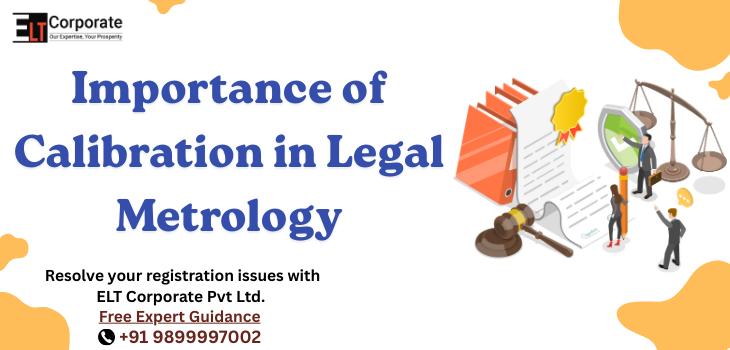The calibration in legal metrology is one of the most important columns of legal metrology compliance. This ensures that the weight and remedies used in business provide accurate, consistent and reliable results. Under the Legal Metrology Act, 2009 and Packed Commodities Rules, 2011, the equipment should be calibrated from time to time to measure every business or equipment dealing with pre-packed goods and to preserve consumer rights and prevent improper trade practices.
This guide explains why calibration matters, who needs it, is involved in the process, and how businesses can remain obedient.
Who Needs Calibration in Legal Metrology?
Any business that uses weighing or measuring instruments for commercial transactions must ensure calibration in legal metrology. This includes:
- Manufacturers – who produce weighing scales, flow meters, or measuring devices.
- Importers – who bring instruments or packaged goods requiring measurement.
- Retailers & Dealers – who sell pre-packaged goods with declared net weight or volume.
- Service Providers – fuel stations, hospitals, and laboratories using calibrated devices.
Why Calibration is Important?
Calibration is not just a legal requirement—it’s a business necessity. It ensures:
- Accuracy in Measurement – eliminates errors in weight/volume declarations.
- Consumer Confidence – fair trade practices build trust and brand loyalty.
- Regulatory Compliance – avoids penalties under LMPC rules.
- Operational Efficiency – well-calibrated machines reduce wastage and disputes.
- Global Standards Alignment – helps businesses compete internationally.
Common Focus Areas During Calibration Checks
| S.No. | Calibration Area | What Authorities Verify |
| 1. | Weighing Scales | Regular stamping, accuracy within permissible error limits |
| 2. | Fuel Dispensers | Volume delivered per litre vs. actual |
| 3. | Flow Meters | Calibration certificates and functionality |
| 4. | Packaging Machines | Net weight/volume matches the declared label |
| 5. | Medical & Lab Instruments | Proper calibration logs and certificates maintained |
Step-by-Step Guide to Ensure Calibration Compliance
Step 1 – Register Instruments
All measuring instruments must be registered and stamped by Legal Metrology authorities.
Step 2 – Schedule Regular Calibration
Follow the prescribed calibration intervals (monthly, quarterly, or annually depending on instrument type).
Step 3 – Maintain Calibration Certificates
Keep records issued by authorized labs or metrology officers.
Step 4 – Conduct Internal Checks
Cross-verify random samples to ensure results match declared quantities.
Step 5 – Train Staff
Educate operators to identify signs of inaccuracy and maintain proper records.
Step 6 – Address Discrepancies Immediately
If errors are found, recalibrate or replace the instrument and submit compliance reports.
Documents Required for Calibration Audit
- Valid LMPC Registration Certificate
- Calibration Certificates from authorized labs/officers
- Stamping Records of Instruments
- Product Label Samples with Declared Net Quantity
- Purchase/Sales Records linked to weighing/measuring equipment
- Internal Calibration Logs
Penalties for Non-Compliance
Failing to calibrate instruments or maintain records may lead to:
- Fines up to ₹50,000 depending on violation.
- Seizure of Goods or Instruments until recalibrated.
- Suspension of Operations in case of repeated non-compliance.
- Criminal Liability including imprisonment for fraudulent practices.
How ELT Corporate Assists Businesses in Calibration
At ELT Corporate, we simplify calibration compliance through:
- Pre-Audit Checks – reviewing calibration logs and instruments.
- Documentation Support – organizing and maintaining calibration certificates.
- Training & Advisory – educating teams on proper usage and error prevention.
- Coordination with Authorities – during stamping and verification.
- Post-Audit Compliance – ensuring prompt corrective actions.
FAQs
Q1. How often should instruments be calibrated?
Depends on instrument type—fuel dispensers and scales often require annual calibration; packaging machines may need more frequent checks.
Q2. Can calibration be done by private labs?
Yes, but only if they are government-approved or accredited under Legal Metrology.
Q3. Do importers need calibration checks in India?
Yes, imported instruments must be calibrated and stamped by Indian Legal Metrology authorities before use.
Conclusion
Calibration is not a legal formality – it is the foundation of fair trade, consumer trust and business credibility. Exactly, caring businesses display transparency, avoid controversies and create long -term market stability.
Need expert guidance for calibration compliance?
Contact ELT Corporate today for complete calibration support, documentation and Calibration in Legal Metrology compliance solution.








